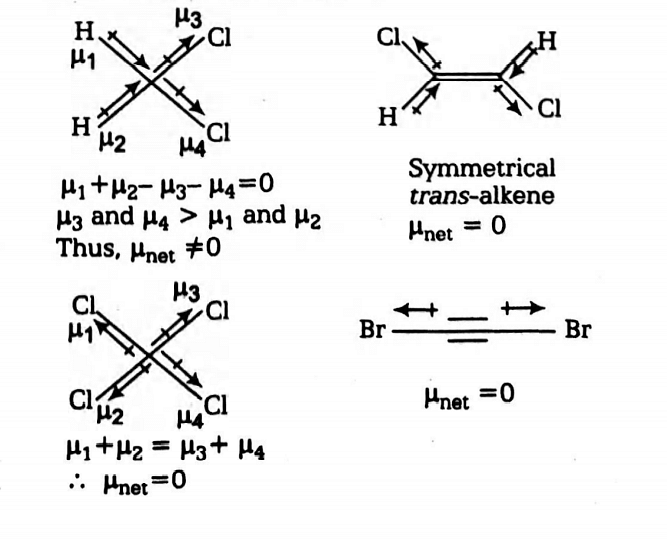The compound that will have a permanent dipole moment among the following is
- $I$
- $II$
- $III$
- $IV$
The Correct Option is A
Solution and Explanation
$CH _{2} Cl _{2}$ is not a symmetrical molecule, thus it will have a permanent dipole.

Top Questions on Polarity of bonds
- Which of the following is a non-polar molecule?
- KEAM - 2025
- Chemistry
- Polarity of bonds
- Compound A formed in the following reaction reacts with B gives the product C. Find out A and B.\[ \text{CH}_3 - \text{C} \equiv \text{CH} + \text{Na} \xrightarrow{} \text{A}\xrightarrow{B} \text{CH}_3 - \text{C} \equiv \text{C} - \text{CH}_2 - \text{CH}_2 + \text{NaBr}(C)\]
- JEE Main - 2024
- Chemistry
- Polarity of bonds
- Choose the polar molecule from the following:
- JEE Main - 2024
- Chemistry
- Polarity of bonds
- Which of the following has a non-zero dipole moment?
- MHT CET - 2024
- Chemistry
- Polarity of bonds
- Which one of the following pairs is an example of polar molecular solids ?
- JEE Main - 2023
- Chemistry
- Polarity of bonds
Questions Asked in WBJEE exam
- Figure shows the graph of angle of deviation \( \delta \) versus angle of incidence \( i \) for a light ray striking a prism. The prism angle is

- WBJEE - 2025
- Refraction Through A Prism
- Ruma reached the metro station and found that the escalator was not working. She walked up the stationary escalator with velocity \( v_1 \) in time \( t_1 \). On another day, if she remains stationary on the escalator moving with velocity \( v_2 \), the escalator takes her up in time \( t_2 \). The time taken by her to walk up with velocity \( v_1 \) on the moving escalator will be:
- WBJEE - 2025
- Relative Motion
- The compound(s) showing optical activity is/are
- WBJEE - 2025
- Stoichiometry and Stoichiometric Calculations
Which of the following statement(s) is/are correct about the given compound?

- WBJEE - 2025
- Organic Chemistry
- X is an extensive property and x is an intensive property of a thermodynamic system. Which of the following statement(s) is (are) correct?
- WBJEE - 2025
- Thermodynamics
Concepts Used:
Polarity of bonds
Polarity, in chemical bonding, distribution of electrical charge over the atoms joined by the bond. Specifically, while bonds between identical atoms, as in H2, are electrically uniform in the sense that both hydrogen atoms are electrically neutral, bonds between atoms of different elements are electrically inequivalent.
Non-polar Covalent Bond:
A non-polar covalent bond is a type of chemical bond that is formed when electrons are shared equally between two atoms. Thus, in an atom, the number of electrons shared by the adjacent atoms will be the same.
The covalent bond is also termed as nonpolar because the difference in electronegativity is mostly negligible.
Polar Covalent Bond:
A polar covalent bond exists when atoms with different electronegativities share electrons in a covalent bond. Consider the hydrogen chloride (HCl) molecule. Each atom in HCl requires one more electron to form an inert gas electron configuration.
Dipole Moment
Dipole moment is defined as the product of the magnitude of charge and the distance of separation between the centres of positive and negative charge.
Dipole moment is a vector quantity and it is denoted by µ.
µ = charge (Q) * Distance of separation(r)
The dipole moment is expressed in Debye units (D).